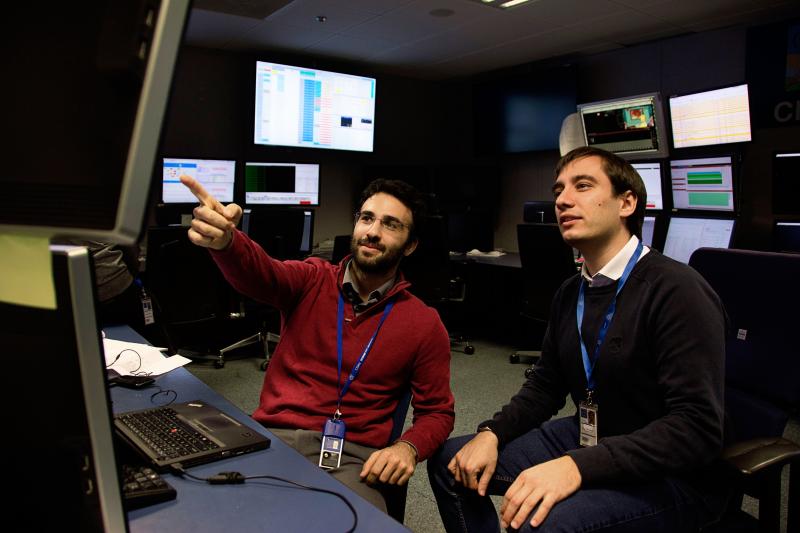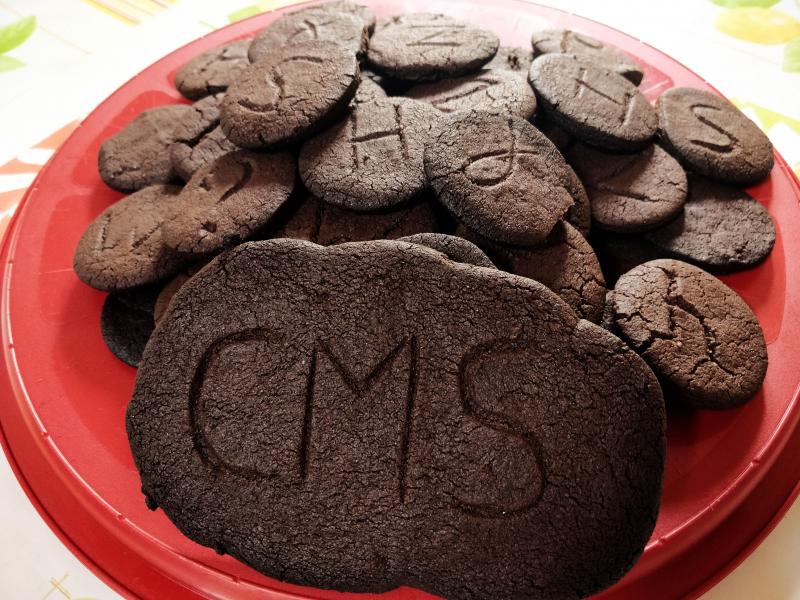CMS has just completed four years of data collection. During this period, all groups within the CMS collaboration contributed to the operation of the detector.
One of many aspects of operating a detector is keeping the detector healthy and running 24 hours a day and 7 days a week. This was the task of CMS collaboration members taking shifts in Point 5 in Cessy, constantly monitoring the subsystems of CMS (tracker, calorimeters and muon systems) as well as taking care of the systems recording the data.
During LHC operation, a full shift crew is needed, with around 10 experts in the CMS Control Room and several others on-call. In the coming two years CMS will not be collecting data but will undergo a series of upgrades, and only a minimal shift crew of two experts will be required.
Below, two CMS members, Andrea Massironi (in a role of a CMS Run Field Manager) and Shervin Nourbakhsh (in a role of a CMS Shift Leader), give a taste of the day-to-day life in the CMS control room.

“Happy shifter equals a shifter who just had a cookie”
Guest post by Andrea Massironi
The Run Field Manager (RFM) is the organizer of the daily activities in CMS, trying to mix all the requests from the different subsystems into a well balanced and harmonious plan. It is a bit like playing Tetris.
The day starts at ... it depends. It can be 3AM if there are issues, as well as a comfortable 7AM. At 9:30 the RFM chairs the Daily Run meeting, where everyone involved with P5 activities (Point 5, P5, is where CMS is located along the LHC ring) provides a small summary of previous day’s work and the proposed actions for the day:
- The Electromagnetic Calorimeter team would like to perform some measurements during the next inter-fill [ndr period during which LHC re-fills the machine with protons/ions]
- The RPCs would like to stay in the global Data Acquisition (DAQ)
- Strips need cosmic muons to align the detector
- Everyone should be ready by the beginning of the next fill
- Where is the coffee?
Everybody should be happy and should manage to successfully test their systems, collect data, and be prepared for the moment when LHC will deliver the next collisions, so that CMS can maintain high efficiency data-taking and performance. And, as the last bullet suggests, it's also a duty of the RFM to make sure coffee is available for the shift crew ;)
The RFM should maintain a full view of the activities for about two weeks, propagating key points of information to the next RFM. In addition, he is the bridge between P5 activities and the Run Coordinators, who are themselves in contact directly with LHC organization.
Then comes the fun part: problem-solving, emergencies, last minute requests from some systems.
Being in the CMS Control Room and coordinating the activities is one of the most exciting and fulfilling activities an experimental physicist can dream of!
By all means, in order to provide good data, an excellent and prepared shift crew is necessary. And without my fellow colleagues who spent hours in the CMS control room, either physically there or on-call for the systems, the excellent performance of CMS would not have been reached!
And since good data depends on efficient shifters, and a happy shifter is an efficient shifter, and a shifter who just had a nice cookie is a happy shifter ... my personal strategy is to provide to the control room shifters with gorgeous biscuits, with a special reference to CMS.

Plans are nice, but most of the time, things are not as exactly as planned”
Guest post by Shervin Nourbakhsh
-- Morning shift --
Ring... ring.. this is my alarm, set to 05:45. Early wake up, to be at Point 5 by 6:45 and get the news from the previous shifter and let him go few minutes in advance (I see in his eyes that he appreciates it). Once all the other shifters have taken their places I say "Hello" to each one and make sure that they are aware of what happened during the previous shift and I pass special instructions, if there is any. Usually, the data taking is inherited from the previous shifter and the shift starts in a relaxed way.
At 8AM, people start to show up in the Control Room: detector experts and on-call experts arrive for the daily run meeting with the Run Field Manager to decide the plan of the day. Often the nice Run Field Manager brings something to eat and he does it exactly when your stomach starts demanding a second breakfast. At 10AM, you know the plan of the day. Plans are nice, but most of the time, things are not as exactly as planned, and in that case, the Shift Leader acts as a leader and re-adjusts the activities to make sure that the plan is accomplished. The morning shift is by far the most dynamic one, with lots of things to learn, with many experts around and with the reassuring presence of the Run Field Manager.
-- Night shift --
After dinner, I prepare my bag with what is absolutely needed for my shift: tea, biscuits, tea, fruits, tea... and tea... The night is going to be long, and something hot and something to eat are essential to keep your mind awake and your body warm.
The night shift is supposed to be the quietest one, with no subdetector tests and with the whole CMS taking either cosmic or collision data. As a shift leader it is important to keep the crew focused and responsive to anomalies, so talking to the crew regularly is very important, especially during the very quiet night shifts. Tea, coffee, biscuits are your best allies. "Smoke alarm", "power glitch", "subdetector off", "subdetector not taking data"... that’s is not going to happen during every shift, but the probability that something does not go as expected in eight hours is not so uncommon, especially during MY shift, simply because of Murphy's law. But when something goes clearly wrong, the action list is clear, and the subdetector experts have to be awakened.
What is instead more problematic are not "big disasters", but when something is simply not completely normal and I need to understand if it is important or not. Experience in the control room and as a shift leader is essential in these cases and also a good communication with the rest of the shift crew:
- Data Control system (DCS) - Anything anomalous on the alarm panel?
- Data Control system (DCS) - Are all the subtectectors ON and working?
- Data Quality Monitoring (DQM) - Any anomaly in the data quality plots? Can you check in more detail those of a specific subtector?
- Data Acquisition (DAQ): which is the subdetector raising an alarm? Is there any standard action to take? Is it completely blocking the data taking?
- Trigger, are the trigger rates normal? Can we reduce the rate for a few minutes?
As a shift leader I'm in charge, but I'm not alone and I have always a last resort... call the Run Field Manager…
Doing shifts at P5 is not an experimental duty for me, but it is really a pleasure, feeling at the source of the precious data that are analyzed by hundreds of scientists to build enthusiastically new results. I think that every shifter should feel proud of their contribution to the CMS success. Being the CMS Shift Leader is an extremely enriching experience, increasing my knowledge about the CMS detector and having the privilege of knowing the men and women that make sure that the CMS detector works at its best every day.
The views expressed in CMS blogs are personal views of the author and do not necessarily represent official views of the CMS collaboration.
